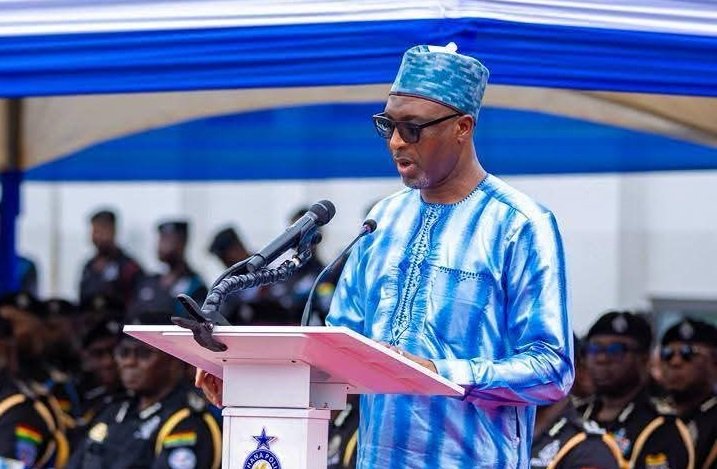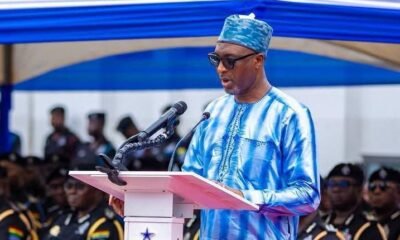News
GEXIM seeks strategic partnerships to finance Ghanaian businesses

In line with President John Dramani Mahama’s agenda to position Ghanaian businesses to play a major role in driving Ghana’s economic growth, management of the Ghana Export – Import Bank (GEXIM) is seeking strategic partnership with the country’s development partners, development finance institutes, export credit agencies and other global investors to support Ghanaian businesses.

The Acting Chief Executive of GEXIM, Sylvester Adinam Mensah led a management team from the bank to engage various financial institutions and funding agencies on the side-lines of the recently held 2025 Spring Meetings of the International Monetary Fund (IMF) and World Bank Group (WBG) in Washington DC., from 21st to 26th April 2025.
The GEXIM team met with the leadership of the Export – Import Bank of the United States of America (US EXIM Bank), African Export – Import Bank (Afreximbank), Saudi Fund for Development (SFD), Kuwait Fund for Arab Economic Development (KFAED), International Trade Administration of the U.S. Department of Commerce, US Africa Trade Desk and Cygnum Capital.
Mr. Sylvester Mensah revealed that the engagements were to explore strategic collaborations to secure funding solutions to assist Ghanaian businesses to explore new markets.
“We had the opportunity to share our strategic direction and immediate priorities in line with President Mahama’s resetting agenda in addition to some of our bankable pipeline projects in our meetings. I am particularly excited about the prospects of our meetings based on the positive and encouraging feedback received so far and convinced of securing funding to support Ghanaian businesses to enable them to contribute to economic development. Currently, the high cost of local financing with short-term interest rates is a disincentive for local traders, inhibiting the expansion of most Ghanaian businesses,” he emphasized.
Over the years, financing has remained one of the key barriers to the development of Ghanaian businesses. A 2020 survey by the Ghana Enterprises Agency (GEA) revealed that sixty percent (60%) of Small and Medium-sized Enterprise (SME) owners identified funding, inadequate skills in financial management and business planning as significant challenges facing their businesses.
News
Speaker engages first term members of parliament

The Speaker of Parliament Alban Sumana Kingsford Bagbin has met first term Members of Parliament to strengthen cooperation between his office and newly elected legislators.
The engagement was organised to help build better working relations and improve communication within the House.
Bagbin stressed the value of open interaction and mentioned that similar sessions will later involve continuing MPs, the media and the public through televised programmes.
He reiterated the 9th Parliament’s goal of promoting openness and inclusion, describing integrity, honesty, civility and participation as key values for national progress.
He encouraged the creation of a mentorship system to allow experienced members to guide new ones.
Bagbin reflected on the growth of Ghana’s legislature over the years, noting a shift from strong partisan conduct to a more mature multiparty atmosphere.
He urged MPs to maintain their party identity while working together for development.
Present at the meeting were the Clerk to Parliament Ebenezer Ahumah Djietror, the Deputy Majority Whip Comfort Doyoe Cudjoe and the Deputy Minority Leader Patricia Appiagyei.
By: Jacob Aggrey
News
Interior ministry orders probe into alleged assassination attempt on Special Prosecutor

The attention of the Ministry of the Interior has been drawn to information that the Special Prosecutor (OSP), Mr. Kissi Agyebeng, has survived two assassination attempts while discharging his duties to the Republic.
According to the ministry in a statement, the Director of Strategy, Research, and Communications at the Office of the Special Prosecutor, Mr. Samuel Appiah Darko, mentioned the assassination attempt on Newsfile, a television station in Accra, on December 6, 2025.
He also claimed on the same programme that he had been handcuffed and beaten by 17 police personnel.
“Beyond the security implications of these claims, such dangers to personnel of accountability institutions, if true, can undermine the government’s efforts to combat corruption, which have intensified since it took office,” the ministry stated,
The Ministry has therefore taken up the matter with the seriousness it deserves with some preliminary findings on the alleged assassination attempt.
The ministry revealed that initial contacts with Mr. Kissi Agyebeng have revealed that the assassination attempts on him, as claimed, happened before this year.
“There is no record or report of such threats against his life at any police station or at any of the state security agencies in the country,” the statement further added.
Against this backdrop, the Minister of Interior, Muntaka Mohammed-Mubarak has further directed that “Since crime does not expire, the Ministry has ordered a full-scale investigation into the claim of assassination attempts.”
The Ministry has also ordered an investigation into the claim by Mr. Samuel Appiah Darko that he was handcuffed and beaten by 17 police personnel.
The Ministry noted that it will update the public on the outcome of these investigations and the actions to be taken.
The Ministry of Interior has reiterated its commitment to protecting all lives and properties to ensure that all Ghanaians can conduct their lawful affairs without any fear for their safety.














